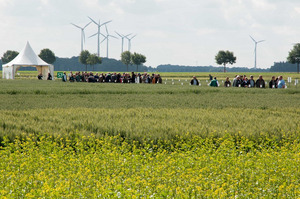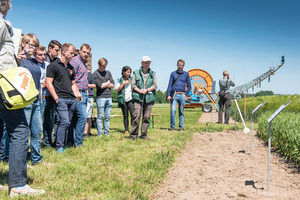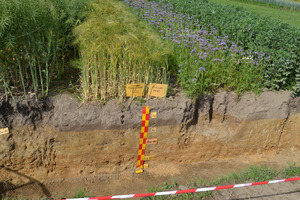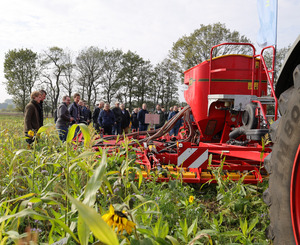Case study 3: Germany: Crop diversification to improve water quality stability
Cluster 1: Service crops
In Lower Saxony, high stocking rates and economic pressure caused a simplification of cropping systems. As a result of this development, nitrogen levels in ground water rose, thus giving rise to stricter fertilization laws. The area of Lower Saxony is characterized by a diversity of farming systems including specialized livestock production, specialized cropping systems and mixed farming systems. The challenge is to develop and introduce key changes in farmer practices to fulfil economic and nitrogen-use requirements in order to maintain stable farm incomes while reducing the environmental impacts.
What were the main problems underlying the emergence of the case study?
At the beginning of the case study, the area was seeing rising levels of nitrogen in ground water caused by high organic fertilizer use on sandy soils and simplified crop rotations to meet the needs of widespread animal production. Stricter general fertilization laws coupled with harsh weather conditions increased the problem of nitrogen leaching, which affected soil fertility. While fertilization becomes more and more limited in many ways and weather conditions become more extreme, the potential of fertile and resilient soils has become a focus. With a diversity of farming systems in the area ranging from specialized livestock production to specialized cropping systems, in addition to mixed farming practices, countermeasures are difficult to implement.
How was the problem addressed and which actors were involved?
The challenge is to develop and implement crop rotation sequences that can not only reduce the high risk of nitrogen leaching but also provide the soil with valuable organic matter, improving soil structure and soil life. Therefore, data and experiences gained from the ongoing advisory services in drinking water protection as well as on-farm experiences on reduced tillage in Lower Saxony are used to develop suitable solutions on individual farms in the centre of Lower Saxony, around the regional office Nienburg of LWK Niedersachsen. While approaches using permanent green fields as a possible solution are not widespread in this area, a network of farms is set up to test single measures and adapt them to the current situation in the region.
Solution investigated
With additional catch crops and undersown crops in the main crop as the most important measures, regional farms with existing experience in these practices were identified and grouped in a farm network. Instead of creating totally new approaches and solutions, the existing experiences were collected and evaluated. Since the availability of knowledge about such topics seems to be one of the main problems, collected experiences and information has been gathered and prepared for further dissemination to a broader public. Meanwhile, new approaches such as direct seeding and other plant-in-green methods are discussed in the network and will be tested in practice to give further recommendations. All these ideas and experiences led to different simulations on the levels of individual crop rotations but also on a regional scale, accumulating the combined effects of different farm types and adapted crop rotation strategies.
Expected outcome
The collection and sharing of actual niche solutions and experiences on individual farms to a broader group of farmers should lead to a wider adoption of the recommended measures. A more frequent use of catch crops, even over short periods, or the introduction of undersown crops will allow the farms to reduce mineral fertilization, and reduce nitrogen losses through enhanced plant-soil interactions. The outlined changes in crop rotations will also be applicable in solutions for other problems such as stricter laws on pesticide use or more extreme weather conditions.
While an assessment of these changes in the crop rotation showed the feasibility of these impacts, drawbacks on economic indicators were observed, highlighting the need to further ajust individual crop rotation sequences. The importance of tailored solutions as well as the interaction of these solutions on different farm types will be shown by the catchment-based analysis, using the MAELIA model. Together with these results, adequate information shall be gathered to stress the importance of diversified cropping systems in today’s agriculture, offer solutions for individual farms and situations, and highlight potential as well as points of action on a regional scale.
Relevance to the DiverIMPACTS goals
The case study collects and shares existing as well as innovative information about the opportunities and risks of diversified cropping systems, focussing on increased soil fertility. With the aim to create and disseminate solutions for different farm types to enhance plant cover on the field, farmers have been enabled to increase their economic stability, reduce artificial inputs and lower their environmental impact. Improved nitrogen and water storage in the soil by prolonged periods with living roots and increased carbon inputs not only reduces nitrogen leaching but also reduces greenhouse gas emissions and stabilizes yields. The combination of individual experiments and experiences of the case study farmers and the modelled approaches on the field and regional level will, therefore, help assess different approaches to reach the different goals of crop diversification, set by the case study. This process will enable the further development of effective crop sequences for different farm types and provide specific advice for several situations. Simultaneously, specific expert knowledge is adapted for a broader public and ways to further disseminate and teach the gained experiences and innovative practices have been.
Case study legacy
With the end of DiverIMPACTS, connections with regional working groups from the German association for conservation agriculture (GKB e.V.) have been made with the aim to sustain and enlarge the sharing of experiences around the farmer-network as well as the development of further knowledge and experiences. In addition to this, a collaboration with the Horizon 2020 project SHERPA (See link below) and its Multi-Actor Platform in Nienburg led to further stakeholder-workshops and discussions on how the regional experiences for more sustainable agriculture could be spread further and implemented in sustainable value-chain solutions. This collaboration will continue beyond the end of DiverIMPACTS. Together with different regional actors, a strategy will be built to create and support smaller scale value chains based on products from regional farms following more sustainable practices as discussed in the case study.
Further information
Links
- rural-interfaces.eu: SHERPA Rural Science-Society-Policy Interfaces
- zenodo.org: Mit diversen Fruchtfolgen den Wasserschutz stärken – LWK & DiverIMPACTS
Case study team
- Hauke Ahnemann, LWK Niedersachsen, case study leader
- Dirk Ehlers, LWK Niedersachsen, case study monitor




 tap and then scroll down to the Add to Home Screen command.
tap and then scroll down to the Add to Home Screen command.